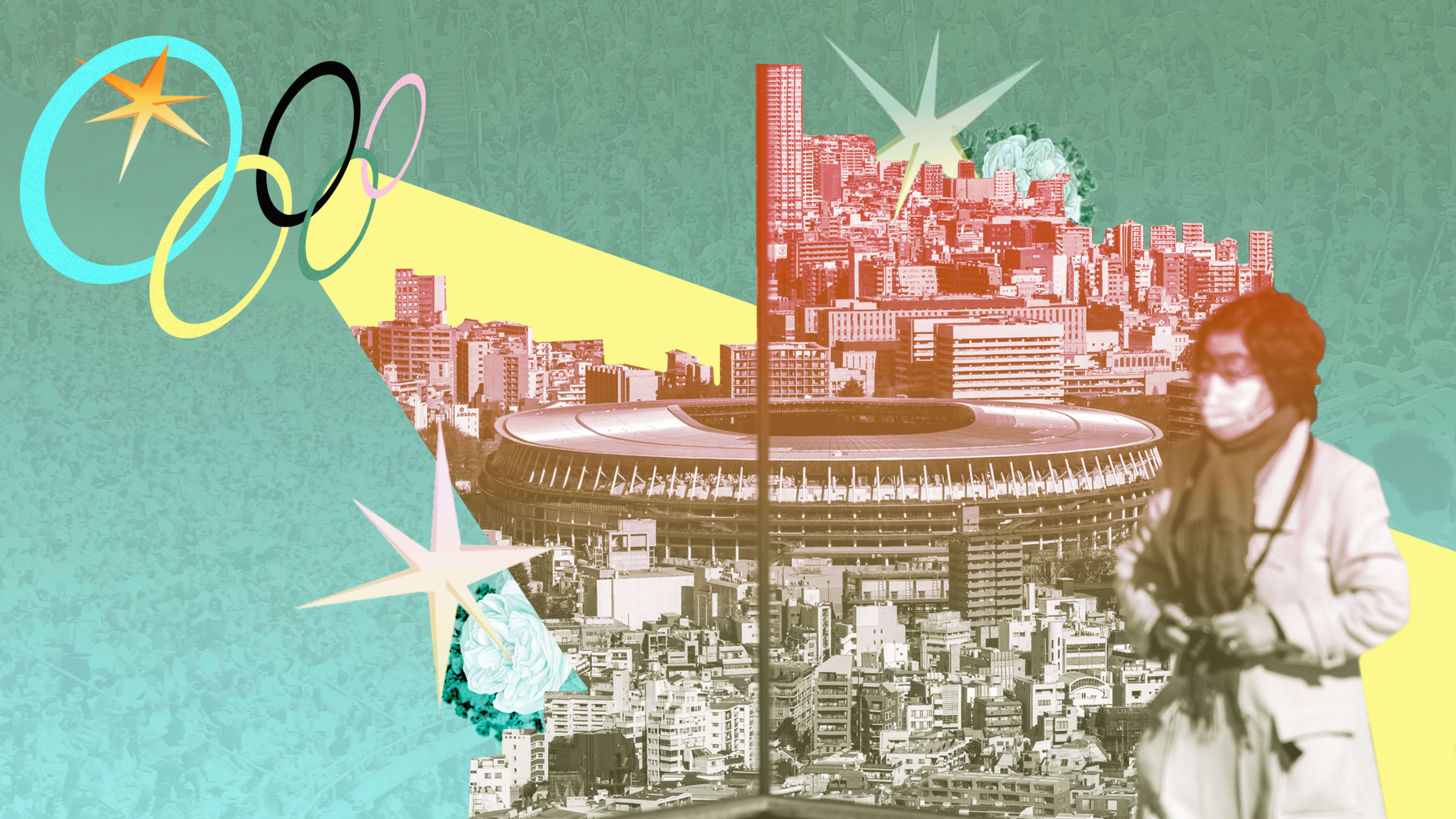This story is part of The Road Ahead, a series that examines the future of travel and how we’ll experience the world after the pandemic.
For decades, hosting the winter or summer games meant the lower-right-hand ring of the Olympics symbol: green. Cities around the globe battled fiercely and competitively to welcome the world’s best athletes, and the throngs of spectators who wanted to see them, for the promise of basking in the glow of their triumphs and enjoying the economic bump that went along with it.
But the idea that the Olympic Games translates into a hefty infusion of money for community coffers has begun to tarnish, like patinas on those much-coveted, hard-earned medals. And nowhere is the push and pull between robust economic impact and budgetary horror more on display than at the upcoming Summer Olympics in Tokyo.
While organizers of this year’s—technically, last year’s—Olympics maintain that their finances are and will remain healthy, experts say that’s unlikely, arguing that even under the best circumstances, host cities stand to lose money. With a global pandemic and a yearlong delay, the bottom line quickly goes from black (middle ring) to red (upper-right-hand ring).
“When you think, then, why countries would bother hosting the Olympic Games, one thing that should be noted is it’s kind of like fool’s gold,” says Robert Baade, an economics professor at Lake Forest College who studies the Olympics. “When you consider the Tokyo Games, that risk–reward profile has deteriorated even further.”
Put down your bottle of hand sanitizer for a moment and zoom back to 2013, when Japan’s capital city was selected as the 2020 host, beating Istanbul and Madrid. When the International Olympic Committee (IOC) awarded the games to Tokyo, Japan’s then-prime minister, Shinzo Abe, said, “the joy was even greater than when I won my own election.”
At the time Tokyo won the bid to host what were then the 2020 games, the estimated price tag was $7.5 billion. In the interim, costs have skyrocketed. By 2019, the budget was $12.6 billion, and this past December, the Tokyo Olympics organizing committee said the new tally would be $15.4 billion, up 22% from the previous year’s estimate.
By December, “COVID-19 countermeasures” were already $900 million.”
Blame COVID-19-required delays and all the headaches that go hand in Latex-gloved hand with them. For example, the December-issued budget reported $900 million for what the committee calls “costs for COVID-19 countermeasures.”
When emailed for comment about the economics of its hosting the Olympics under extraordinary circumstances, Tokyo 2020 (officially called the Tokyo Organising Committee of the Olympic and Paralympic Games) responded with two press releases from December. A sentence in one of them reads:
We will continue to work closely with the International Olympic Committee, the International Paralympic Committee, Tokyo Metropolitan Government and the Government of Japan and all other related organizations to prepare for a safe and secure games while aiming at all possible optimization and streamlining measures to reduce cost.
The summer games officially start on July 23 and the Paralympics on August 24.
Blowing the budget: a time-honored tradition
Despite growing evidence to the contrary, conventional wisdom is still “build it and they will come,” but on those sports fields, that turns into nothing but dreams. The maxim that inviting the world to a municipality brimming with sportsmanship and Bengay translates into an economic boon is proving to be as trite as the feel-good profiles of underdog athletes triumphing against the odds that break up the footage of the events. A University of Oxford study published in September found that every Olympics since 1960 has run over budget; the average cost overrun is 172%.
And the number of cities around the globe submitting bids to host the Olympics has dwindled in recent years. Concerns over wildly increasing expenses, the ability to recoup costs, and potential political backlash—both locally and worldwide—have tempered the enthusiasm usually associated with the storied event. Olympics junkies will recall that Oslo, Stockholm, and Krakow, Poland, were among those that withdrew their bids for the 2022 winter games, while Rome, Hamburg, and Budapest, Hungary, were on the about-face list for the 2024 summer games. (Those mega-events were awarded to Beijing and Paris, respectively.)
It’s all about the sponsors—and the tourists
Like with any investment, a city considering bidding for the Olympics has to consider the risk–reward profile. Hosting requires billions of dollars in explicit costs, such as infrastructure and security, as well the implicit costs of what alternatives that money could be used for—and now won’t be. The return on investment is the money from local and international sponsorships and the money spent by tourists there for the games. In addition, the unquantifiable worldwide attention given to the city is expected to translate into future tourism dollars. People watching the Olympics from home—impressed by opening and closing ceremonies and soaring wide shots of municipal majesty in the background of action-packed sports footage—may be inspired to travel there. Think of the Olympics fortnight as a two-week-long advertising campaign.
Among the people who actually live in host cities, the value of hosting the games is harder to pinpoint. Some residents do get caught up in being part of the global excitement, but many others grow irate about spending inevitably going over budget, the local inflation they’ll likely endure, and the surge in prices around the time of the games.

Now, add to all that the pandemic. Tickets sales will be down because organizers are limiting the number of tickets sold due to social distancing. Plus, observers expect fewer people to be interested in a mega-event like this in the time of COVID-19 anyway. Also in the losses column are the extra expenditures the Tokyo Olympics backers have to shoulder because of the yearlong delay.
“There are costs of maintenance and care, which are not trivial,” Baade says. “Think of everything getting polished prior to the games. You have to repeat that. The grounds have to be kept up. The buildings have to to be heated and cooled.”
Then, there are the COVID-19 costs themselves—testing athletes and sports personnel, hiring gate attendants to take the ticket holders’ temperatures on their way in, building and refilling hand sanitizer stations. The list goes on.
Fellow sports bean counter and College of the Holy Cross professor Victor Matheson agrees with the costs avalanche, calling the 2021 Olympic finances a “nightmare.”
“Even before COVID-19 hit, this Tokyo games was an economic disaster,” he says. “It’s COVID-19-protection precautions on a massive scale. The second cost is probably significantly bigger. Basically, you had to keep all your dates open for another year.”
Plans to tear down sports venues after the games had to be delayed, he points out, plus the wait caused a ripple effect. For example, the athletes’ village was to be turned into condos after the mega-event was over and the advance buyers of those units had to postpone moving in and are seeking damages.
Matheson estimates that Tokyo will take a $5 billion hit—$3 billion to be spent on anti-COVID-19 measures, $1 billion in lost tickets sales, and $1 billion lost for the greater economy by fewer people spending money at local hotels, restaurant meals, transportation, and shopping.
Tokyo 2020’s December numbers were the fifth version of its budget. The Tokyo Metropolitan Government and the Government of Japan are chipping in more for additional COVID-19-related costs—$6.6 billion (up $1 billion), and $2.1 billion (up $700 million), respectively. On the other side of the balance sheet, the local Olympic committee said it foresees revenues increasing by $700 million compared to the previous budget. That money is a $500 million cancellation insurance payout, and the rest includes additional sponsorships, donations, subsidies, and more licensing.
Victor Matheson, professor of economics, College of the Holy CrossCities have already been rethinking wanting to be part of it. This adds just one more piece to that.”
When asked in an email from Fast Company how many fewer tickets in head count and in dollars can be sold due to COVID-19 restrictions, Tokyo 2020’s answer was, “the decision not to accept overseas spectators has been made, and a final decision on the maximum number of spectators in venues will be made in June. We are therefore not yet at the stage of making any potential revenue adjustments.”
On the local sponsorship front, Tokyo 2020 reports that it reached basic agreements at the end of last year with all 68 of its “domestic-partner companies on an extension of their sponsorship contracts.” The expected revenue from those is $3.3 billion, the same figure that’s in the previous version of the budget.
Tokyo is just another stop on the way to a perennial reluctance about anchoring the Olympics. According to experts, it’s become harder and harder for democracies to host the games, so we’ll increasingly see cities in dictatorships or countries with emerging economies stepping up. The anticipation is the IOC will moderate its list of expectations, such as infrastructure requirements, revenue-sharing arrangements, and blank checks. The shift began in 2014 with the IOC’s adopting what it calls Olympic Agenda 2020, a list of reforms. That list was augmented two months ago, when the IOC approved more changes: Olympic Agenda 2020+5.
“Cities have already been . . . rethinking wanting to be part of it. This adds just one more piece to that,” Matheson explains. “The IOC is concerned. They don’t want to be known as the Autocratic Games. They’re the Olympic Games.”
All isn’t completely lost in Tokyo, though. Folks who study the economics of sports say most of the Olympic gold, er, lucre, comes from the sale of television rights in each country and sponsorships, both worldwide and local. Tickets, also known as “live gate,” rank after that.
It’s unclear if broadcasters around the globe and both types of sponsors have renegotiated contracts that were most likely signed years ago. What did those force majeure clauses look like and with the Tokyo Games rescheduled, not canceled, how did those play out? (A sidecar question: Will TV viewership be higher or lower for this Olympics? The yearlong delay may have amped up fans even more than usual and the shared global experience of enduring a pandemic along with everyone else on Earth underscores the ideals of international friendship that the Olympics were created to embody. Alternatively, with many parts of the world slowly getting back to normal after more than a year of Netflixing their brains out, people may prefer to go out and do things themselves, rather than stay home and continue to watch screens.)
The question of the classic legacy benefit—how the sense of excitement translates into tourism in the weeks, months, and years to come—remains, too. Will Tokyo, which also hosted the 1964 Summer Olympics, be viewed as the can-do city that didn’t give up, even in the face of a global pandemic? Or will the new normal override any interest in Tokyo-bound travel?
Either way, experts aren’t buying the line that the games will be a financial success. As far back as October 2018, Japanese government auditors forecast that the Olympics will cost $25 billion.
“Tokyo is screwed,” Matheson says. “But it was screwed even before COVID-19. I say that specifically [in case] someone gives that excuse ‘if not for COVID-19, this would be the greatest event ever.'”
Recognize your brand’s excellence by applying to this year’s Brands That Matter Awards before the early-rate deadline, May 3.
